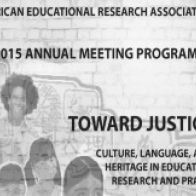
The IBE this year participated in the annual meeting of the American Educational Research Association (AERA) conference concluding today in Chicago. The conference represents the largest gathering of scholars in the field of education research.
IBE Director, M. Marope, contributed to the AREA Presidential Session on equity pedagogies and research methodologies of hope. The panel examined the challenges and hopes of implementing culturally relevant pedagogies in teacher educator to address ongoing challenges and structural changes, as well as lessons learned and implications for others who are doing social justice and equity work in teacher education programs.
During a second session on “Learning from the popular education tradition: Lessons from the Global South”, IBE Director presented a paper about the premise that popular education is ultimately a life perspective and not just an approach to education. She argued that despite its varying traditions, popular education stems from a life perspective that upholds the sanctity of equal rights and opportunities and most importantly, the right to self-determine. The paper highlights convergences and divergences between popular and “conventional” education, placing an accent on the mutual concern for equal right to education, especially for the poor and the marginalized, who, by volume, are in the Global South. It also tracked global dialogue and policies on equal rights to education starting in the 1960s with global normative instruments such as UN Conventions and Recommendations, through decades of Internationally Agreed Goals (IAGs) to the currently emerging Sustainable Development Goals (SDGs).